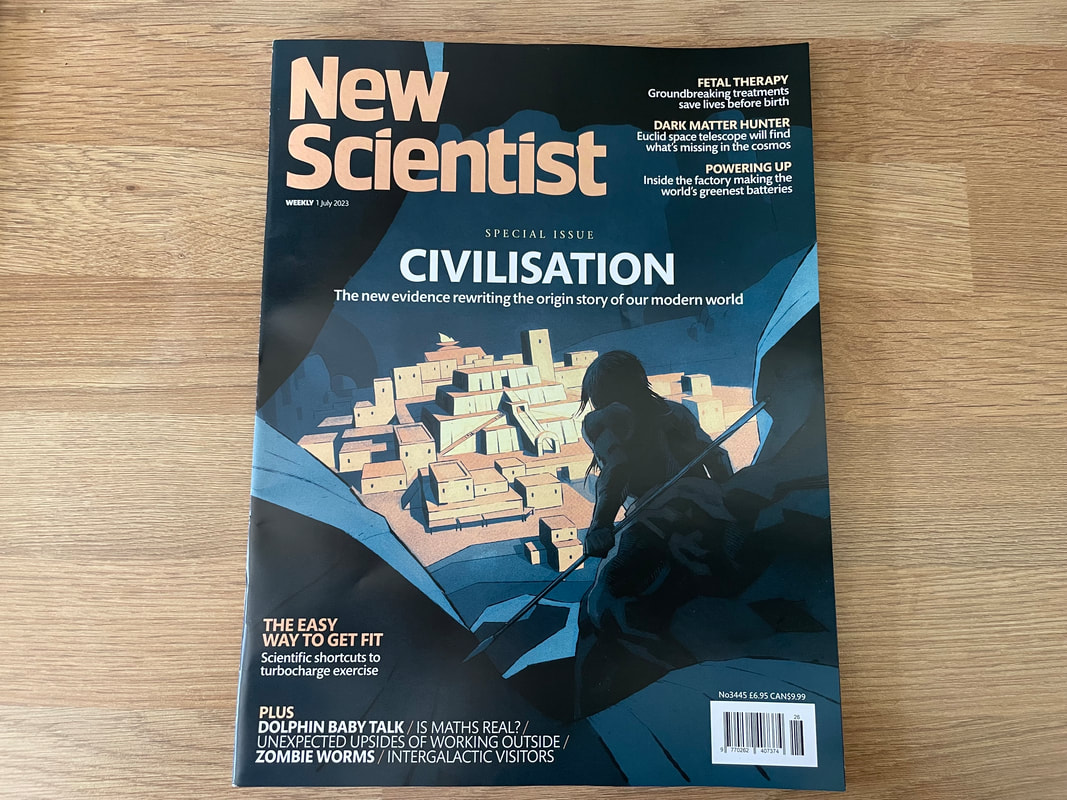After over 15 years as a journalist, I still get a thrill whenever one of my stories is the cover feature. This one for New Scientist is particularly special because it's a special issue: one big main feature and two shorter tie-ins, plus an editorial.
The main feature is called "The civilisation myth: How new discoveries are rewriting human history". It's about the great transformation that began around 10,000 years ago, when societies that were based around hunting and gathering instead took up farming, city living, writing and the other accoutrements of modern life. In particular, it's about why our ancestors did this - and whether the reasons were the same for every society.
The first tie-in story is called "The societies proving that inequality and patriarchy aren't inevitable". It explores the enormous diversity of past societies, many of which can't be neatly fitted into simple categories like "monarchy" or "authoritarian". For example, the degree to which men have dominated society varies considerably.
That leads into the other tie-in story: "Utopia: The ancient discoveries that point to the ideal human society". For this, I asked the anthropologists what they would change about our society. They had quite a lot to say about this, ranging from ending systemic racism to reducing wealth inequality in order to reduce the risk of violent unrest.
Finally, I wrote an editorial called "History reveals vital new lessons in how to make our societies better". Whereas the main features are focused on synthesising what the various experts say, this is more my interpretation. My main argument is that we all have a lot more power to influence the course of history than we think.
The stories are all in issue 3445 of New Scientist, which is in shops now.
Even after all that, I still had some material left over. In the interests of sustainability and reducing waste, I'm going to use it for this month's Our Human Story email newsletter for New Scientist.
The main feature is called "The civilisation myth: How new discoveries are rewriting human history". It's about the great transformation that began around 10,000 years ago, when societies that were based around hunting and gathering instead took up farming, city living, writing and the other accoutrements of modern life. In particular, it's about why our ancestors did this - and whether the reasons were the same for every society.
The first tie-in story is called "The societies proving that inequality and patriarchy aren't inevitable". It explores the enormous diversity of past societies, many of which can't be neatly fitted into simple categories like "monarchy" or "authoritarian". For example, the degree to which men have dominated society varies considerably.
That leads into the other tie-in story: "Utopia: The ancient discoveries that point to the ideal human society". For this, I asked the anthropologists what they would change about our society. They had quite a lot to say about this, ranging from ending systemic racism to reducing wealth inequality in order to reduce the risk of violent unrest.
Finally, I wrote an editorial called "History reveals vital new lessons in how to make our societies better". Whereas the main features are focused on synthesising what the various experts say, this is more my interpretation. My main argument is that we all have a lot more power to influence the course of history than we think.
The stories are all in issue 3445 of New Scientist, which is in shops now.
Even after all that, I still had some material left over. In the interests of sustainability and reducing waste, I'm going to use it for this month's Our Human Story email newsletter for New Scientist.

 RSS Feed
RSS Feed